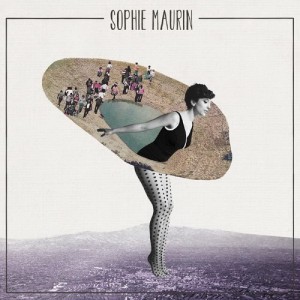Sophie Maurin is a new French pop singer/songwriter who seems to be taking France by storm, or at least that’s the impression I’ve gotten from the things I’ve read about her online. Regardless, her music is amazing. And the artists I’d most compare her to aren’t even French artists, actually. Her style of whimsical songwriting especially reminds me of Regina Spektor and her voice calls to mind A Fine Frenzy. In fact, the album I would most compare Sophie’s album to would be A Fine Frenzy’s sophomore effort, Bomb In A Birdcage. That said, if I had to compare her to French artists I would say that she has the quirkiness of Emilie Simon and the keen pop sensibility of Camille. What really astounds me about Sophie is that this is only her first album and she’s already proven herself as talented as any of the artists I’ve compared her to. In fact, I might actually go so far as to say that this album is even better than some of their albums. But I don’t want to hype her up too much and set you up to be disappointed when you hear her. Oh, who am I kidding — I can’t possibly restrain myself from gushing about how awesome this album is.
One of the most interesting things about Sophie’s music is that she’s clearly been influenced by just about every genre under the sun, including classical, cabaret and jazz. Aside from her voice, the one thing that’s most consistent throughout the album is the piano, but I couldn’t even name all of the other instruments on it. It pretty much has everything but the kitchen sink. And her lyrics are as brilliant as her melodies and arrangements. Not that I understand them particularly well, only having a limited knowledge of French, but from what I do understand they’re quite clever and poetic. Speaking of poems, one of the songs on the album is an adaptation of Jacques Prévert’s poem “Cortège.” Like Lio before her, she’s taken a Prévert poem and turned it into a wonderful, wildly imaginative song. She’s also taken the theme “Piccadilly” by Erik Satie and turned that into a jazzy song that’s half her own in the form of “White Phosphorus.”
The only thing about the album that perplexes me is that it opens with a song called “Far Away” that’s something like 70% in English. There’s more English scattered throughout the album, but she’s taken the song with the most English and made it the first song, which just seems kind of odd for a French pop album. Alas, it is one of the best songs on the album, so I suppose that’s why. But I think, too, that she’s trying to lull in people who normally might not listen to French music, especially since that was the first single and the video was made available on Youtube here in the States, whereas French record labels usually don’t allow them to be viewed here for various reasons. So, I think they’re hoping that Anglophiles who usually don’t listen to French music will fall in love with “Far Away” and then feel compelled to investigate her further, at which point they’ll have already fallen so in love with her that they won’t mind listening to music in French for the first time. You might say that I’m reading too much into it, but this is an album that’s clearly meant to inspire you to think. Or at least wonder. If nothing else, you’ll wonder what instrument is going to suddenly appear next, like the horns that seem to emerge from out of nowhere on “La fantôme.” As for me, I’m wondering how the heck she can she can possibly live up to this on album number two. And yet I have no doubt that she will. I wouldn’t even be surprised if she somehow manages to top this, although I don’t see how that’s quite humanly possible, considering how marvelous and genius it is.


Leave a Reply